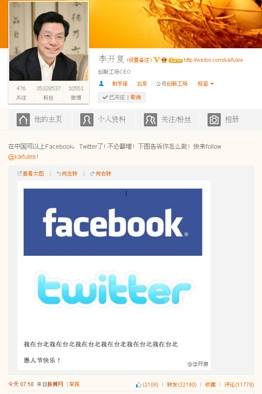(单词翻译:单击)

One of the Chinese Internet's most popular microbloggers, former Google China chief Kai-fu Lee, became the perpetrator of one of the country's most pointed April Fool's jokes on Monday morning.
中国互联网上最知名的微博作者之一、前谷歌公司(Google)中国区总裁李开复周一上午开了中国最尖锐的愚人节玩笑之一。
In a post on Twitter-like microblogging service Sina Weibo, Mr. Lee announced to his 35 million followers that Facebook and Twitter -- both long blocked by the Internet censorship system commonly known as China's Great Firewall -- had suddenly become available.
李开复在新浪微博上向他的3,500万名粉丝宣布,美国社交网站Facebook和推特(Twitter)在中国突然之间被解封了。这两个网站在中国一直被有“防火长城”之称的中国互联网审查系统所屏蔽。
'You can now get on Facebook and Twitter in China! No need to jump over the wall! The image below will tell you how!' he wrote.
他在微博上写道:在中国可以上Facebook,Twitter了KEKE SHAUN!! 不必翻 !下图告诉你怎么做!
Attached to the post was a thumbnail image showing the Facebook and Twitter logos with a small line of text underneath. Users who clicked the image to expand it quickly discovered they'd been duped: 'I'm in Tapei I'm in Taipei I'm in Taipei,' the text read. 'Happy April Fool's Day!'
附在这段文字下的是一幅小图,它包括Facebook和推特的标志以及其下的一行小字。微博用户点击这个图像将其放大后会很快发现,他们被愚弄了。这行小字的内容是:我在台北我在台北我在台北我在台北我在台北我在台北 愚人节快乐!
A Taiwanese citizen, Mr. Lee enjoys a reputation for credibility on the Chinese Internet, thanks in part to his frank and sometimes irreverent takes on everything from China's struggle to innovate to censors' more extreme efforts to control conversation online. Last month, his Sina Weibo account was suspended for three days after he posted comments critical of state-run search engine Jike -- an episode that only served to bolster his status in the eyes of many Chinese microbloggers.
身为台湾人的李开复在中国互联网上一向享有真实可信的声誉,这一定程度上要归功于他经常就中国的各种现象发表直率、有时甚至不恭的评论,这些现象从中国创新乏力到中国审查人员控制互联网上言论的更极端努力,不一而足。上个月,李开复的新浪微博账户曾被暂停了三天,此前他在网上发表了对国营搜索引擎“即刻搜索”的批评性评论。这一小插曲反而起到了提升他在中国许多微博作者眼中形象的作用。
That background helps explain how his prank post, which had been reposted nearly 30,000 times by early Monday evening, sucked in so many.
这一背景情况有助于解释李开复的那则恶作剧帖子为何骗倒了那么多人。他的那则微博周一傍晚前被转发了近30,000次。
Among the more than 10,000 comments the post drew, plenty were angry.
在这则帖子后面的10,000多条评论中,有许多都透着愤怒。
'You shouldn't be so unkind,' wrote one Sina Weibo user.
一名新浪微博用户写道:你不应该如此不厚道。
'hate you!' another wrote in English.
另一名微博用户用英文写道:hate you!(恨你)
Twitter was shoved outside the Great Firewall in June 2009 with Facebook following a few weeks later. Neither had built up a large Chinese user base before being blocked, though both are now the subject of widespread curiosity among Chinese Internet users without the means to jump over the wall.
推特于2009年6月被中国挡在了“防火长城”之外,几周之后Facebook也遭遇了同样命运。这两个社交网站在被屏蔽之前都尚未在中国建立起庞大的用户基础,但中国那些没有办法翻越防火长城的网民目前普遍对这两个网站存有好奇。
'I really want to understand the outside world. I really want to hear different voices,' was the response to Mr. Lee's prank from one plaintive microblogger.
一名哀伤的微博作者回应李开复的恶作剧说:我真的想了解外部世界。我真的想听到不同的声音。
Not all were upset. A few with the technology to access the outside Internet even joined Mr. Lee in gloating.
并非所有的中国网民都被李开复的恶作剧搞得心烦意乱。一些有技术手段登陆外部互联网的人甚至也像李开复那样表现出洋洋自得之情。
'Of course you can get on!' wrote one. 'PS: I work at a foreign company. I work at a foreign company. I work at a foreign company...'
一名网民说:当然能上。顺带说一句:我在一家外企工作。我在一家外企工作。我在一家外企工作......
Still others decided to go with a semantic response, taking advantage of Beijing's insistence that Taiwan is part of China rather than an independent country.
但也有一些网民决定利用北京坚持称台湾是中国的一部分而非一个独立国家的说法,与李开复在语义上较较真。
'Teacher Lee is being naughty and breaking the rules, speaking truth on April Fool's Day. Taiwan is a part of China. If you can get on Facebook and Twitter in Taiwan, that means these two things are available in China,' wrote a Sina Weibo users posting under the handle sadychen.
一名网名为sadychen的新浪微博用户写道:李老师淘气,你违反规则在愚人节这天说了实话。台湾是中国的一部分,如果你能在台湾上Facebook和推特,这就意味着在中国能上这两个网站。
'I hope Taiwan recaptures the mainland sooner rather than later,' said another.
另一名网名写道:我希望台湾尽快收复大陆。


